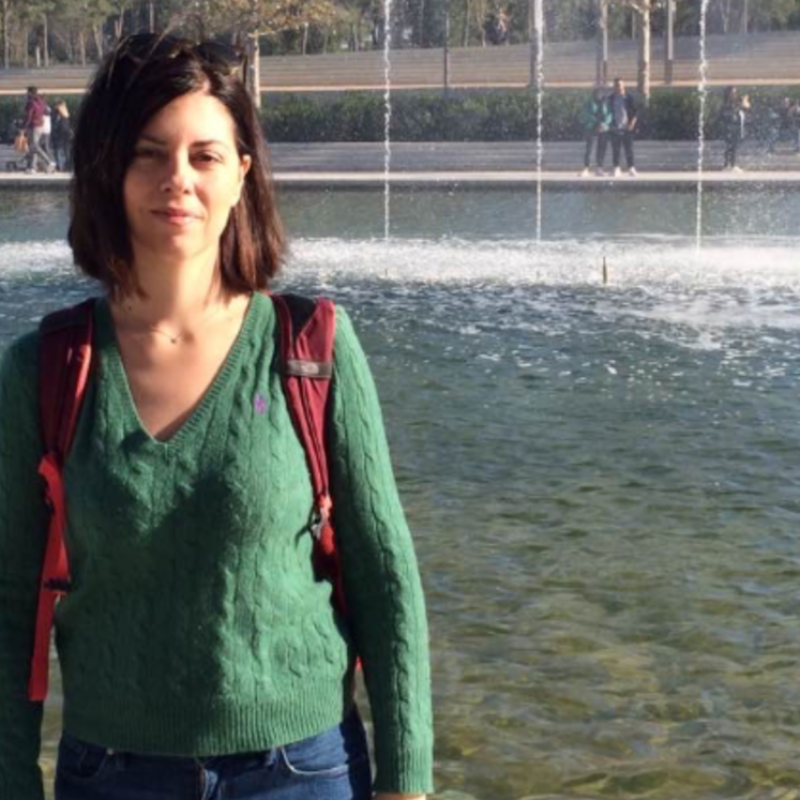Vassiliki (Vicky) Stamatopoulou, PhD was recently elected Assistant Professor of Biochemistry in the Department of Medicine of the University of Patras after nearly 20 years of studies and research in Greece and abroad. She started her studies in 2000 at the newly in that time established Department of Biochemistry & Biotechnology at the University of Thessaly and then she obtained a master’s and doctoral degree in Pathology from the University of Patras Medical School. She has worked as a postdoctoral researcher at the University of Strasbourg in France, at the Institute of Technology in Switzerland, at the Institute of Biology and Molecular Medicine in Belgium and at the School of Medicine in Patras until 2018.
Vicky’s research interests focus on the biology and metabolism of RNA. In particular, she investigates the structure of small and large non-coding RNA molecules, of both prokaryotic and eukaryotic origins, their interactions with proteins and their involvement in disease induction. In a recent issue of the journal Nature Protocols, Vicky describes the development of an innovative methodology for the prediction and diagnosis of diseases related to changes in the structure of the cell nucleus. Such changes lead to various diseases such as blood neoplasms and their early diagnosis can benefit patients either by prolonging their life expectancy or by helping doctors choose better treatments.
A major problem in the treatment of bacterial infections is that these organisms are becoming increasingly resistant to antibiotics. Vicky has described in her study how better understanding of these microorganisms’ RNA structure and function is a key point to combat them. Thus, by intervening in this mechanism we can create more effective drugs against bacterial infections.
Vicky told us about her work, her research interests and shared details of her daily life:
How did you decide to work as a researcher?
Although it is generally difficult to provide an answer that non-researchers will understand, research is a low-paying profession-hobby, it consumes your mental energy, and almost entirely your personal time and requires complete dedication, patience and persistence! However, the few moments of satisfaction you get are truly rewarding and provide you with the pleasure that you have contributed to knowledge enrichment that all researchers seek. Looking back at my undergraduate years and the first time I held a pipette in my hands, I realize now that I could not have gone any other way. The motivation for me has been and is that research gives you the opportunity to ask, search, investigate, make mistakes, learn and – very important to me – not get bored.
Which part of your job are you most proud of so far?
I am absolutely certain that the most beautiful and important part of my job is that within a few years I have been able to work in different international research environments, with colleagues of different nationalities and cultures. That alone changed me as a person, expanded my spiritual and social horizons, let me make invaluable friends and helped me mature as a researcher. It is very important for researchers -and not only- to learn and live beyond their home country to improve both their research and interpersonal skills.
Is there a special person in your life who inspired you to follow this path?
In reality no. This choice seemed like a one-way path to me, it is as if my own life and my love of research has driven me. Today, having an academic background, I laugh at the thought that at the end of each project I think that I was tired and not doing research again, but in the end something always kept me interested and I would continue either way. However, I must say that the fact that I was able to follow this path is due to the immense support — psychological and financial — of my caring and loving parents.
Have you ever had problems with your male colleagues?
I am lucky very lucky to have never faced sexism or at least I refused to accept it, despite most of my colleagues and senior supervisors were men. Of course, sometimes small problems in collaborations might have arisen, but never because of my gender. Unfortunately, however, I know that this is a very big issue and I have very good friends who are Greek researchers and are experiencing sexism which is unacceptable, especially for multicultural countries like the USA.
What is unique about RNA to make you devote your research to it?
Initially the choice was random. Basically, I first chose the mentor and the topic came up. However, when I was given the opportunity to change projects, I did not. RNA Biology had and still has for me the element of evolutionary survival of this primordial molecule and at the same time the beauty of a raw gem that by constantly searching for new inexhaustible aspects in it you can discover new mechanisms and new cellular functions.
If at a meeting with a friend one of their kids asked what exactly you were researching how would you explain it?
Difficult to answer, especially when it comes to kids. I would probably try to explain them the purpose of the study and not so much the process. I would explain them how important medicines are, such as vaccines – that they know so well – to relieve themselves, their mom, dad, their siblings, etc. from pain and fever. About the importance of research, I would just say that my effort is based on discovering new ways to help us avoid illnesses or to overcome the symptoms that they cause disease more easily, hoping to get them interested.

RELATED ARTICLES
CONTACT US
____________
greekwomeninstem@gmail.com
Do you have ideas, questions, comments or special requests?
Would you like to highlight your research project or nominate a researcher that you would like to learn more about?
Please write to our email or fill out the form and hit “send”. We will be happy to talk with you!
[contact-form-7 id=”44″ title=”Contact form 1″]
